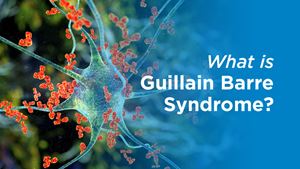
The FDA recently announced patients who received the Johnson & Johnson COVID-19 vaccine have an increased risk of Guillain-Barre syndrome (GBS) within six weeks of receiving their dose. Data on the Pfizer-BioNTech and Moderna COVID-19 vaccines have not found this risk so far.
Emil Lesho, DO, an infectious disease specialist with Rochester Regional Health, and our neurologist team discuss the syndrome and how it is treated.
Guillain-Barre syndrome is a very rare autoimmune disorder that causes the body’s immune system to attack the nerves. There are 3,000-6,000 people diagnosed with the disorder each year in the United States; this affects approximately one in every 100,000 people.
People who suffer from the condition can experience varying degrees of muscle weakness. In some cases, symptoms can spread rapidly through the body and worsen if they are not treated quickly.
Guillain Barre syndrome is not a hereditary or contagious condition.
There are several factors that can increase a person’s risk for Guillain Barre syndrome. People of all ages have been shown to contract the disorder; however, men who are over the age of 50 have a slightly more elevated risk when it comes to the Johnson & Johnson COVID-19 vaccine.
Some people have developed Guillain Barre syndrome after certain illnesses, including influenza and infectious diarrhea caused by Campylobacter jejuni.
There have been some cases of Guillain Barre associated with COVID-19.
According to the CDC, two-thirds of Guillain Barre cases occur following a respiratory illness or diarrhea. Some have developed the syndrome following a surgery. In exceptionally rare cases, certain vaccines can increase the risk of Guillain Barre syndrome. Those include the shingles and influenza vaccines.
“The number of cases of Guillain Barre syndrome linked to vaccines are very low,” Dr. Lesho said. “The protections that vaccines can give a person when it comes to dangerous illnesses and diseases vastly outweigh the risk of other complications.”
Since Guillain-Barre syndrome attacks the body’s nerves, it often begins with a tingling sensation in a person’s legs. The sensation then spreads throughout the body and leads to continued tingling, muscle weakness, and can include difficulty breathing.
Other symptoms include:
The National Institutes of Health states most people are at their weakest within two weeks of symptoms first developing.
There is no known cure for Guillain Barre syndrome. Treatments vary and can include plasma exchanges and high-dose immunoglobulin therapy, according to the CDC.
One of the most important aspects of treatment is ensuring a patient’s breathing can continue, which could mean putting them on a ventilator if the weakness spreads to muscles that control breathing.
The earlier a patient can tell their provider what they are experiencing, the quicker they can get the help they need. Time is important when diagnosing and treating this condition.
Most people are able to recover fully, but the time it takes for a person to recover will vary. Some who have GBS will have permanent nerve damage. In a very small number of cases, people have died from the disorder.